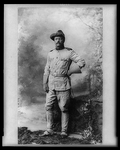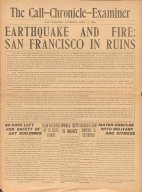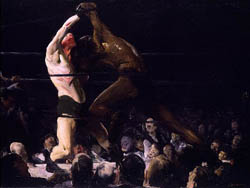1900-1909 |
Political
and Social History |
Literature |
1900 |
12 April. Foraker Act confirms Puerto Rico as an unconsolidated territory of the United States.
Democratic National Convention nominates William Jennings Bryan for president; its platform condemns imperialism and the Gold Standard Act.
 As expected, the Republican National Convention in Philadelphia renominates William McKinley for a second term as president. Despite his protests that he does not want the office, Theodore Roosevelt attends the convention in "Rough Rider" garb and accepts the nomination for vice-president.(Photo courtesy of the American Memory Home Page)
20 June. The revolt known to the West as the Boxer Rebellion breaks out in China.
September. In the worst natural disaster to date in U. S. history, a hurricane sweeps over Galveston, Texas, killing an estimated 6,000-7,000 of its 36,000 inhabitants. As expected, the Republican National Convention in Philadelphia renominates William McKinley for a second term as president. Despite his protests that he does not want the office, Theodore Roosevelt attends the convention in "Rough Rider" garb and accepts the nomination for vice-president.(Photo courtesy of the American Memory Home Page)
20 June. The revolt known to the West as the Boxer Rebellion breaks out in China.
September. In the worst natural disaster to date in U. S. history, a hurricane sweeps over Galveston, Texas, killing an estimated 6,000-7,000 of its 36,000 inhabitants. |
Zitkala-Sa, Impressions of an Indian Childhood, The School Days of an Indian Girl, and An Indian Teacher among Indians published in the January, February, and March Atlantic Monthly.
Charles W. Chesnutt, The House Behind the Cedars
Mark Twain, "The Man that Corrupted Hadleyburg"
Theodore Roosevelt, The Strenuous Age
5 June. Stephen Crane dies at Badenweiler, Germany
Theodore Dreiser, Sister Carrie
Smart Set (1900-1930)
|
1901 |
10 January. Spindletop claim in Texas brings in oil, the first in that region.
4 March. McKinley is inaugurated for his second term as president.
6 September. President McKinley shot by Leon Czolgoz at the Pan-American Exhibition in Buffalo, N. Y. He dies of his wounds on September 14 and Roosevelt is sworn in as president on the same day. (See early movies of the opening of the Exhibition and of McKinley's funeral at the American Memory Home Page.)
16 October. Roosevelt invites Booker T. Washington to the White House. |
Charles W. Chesnutt, The Marrow of Tradition
Frank Norris, The Octopus
|
1902 |
The United Mine Workers go on strike and the owners refuse to recognize the union; as tensions mount and negotiations fail, Roosevelt calls the two sides to the White House and successfully handles the situation.
Newlands Reclamation Act authorizes the building of irrigation dams across the West. |
Ida Tarbell's expose of the oil monopoly, History of the Standard Oil Company, appears in McClure's Magazine.
Upton Sinclair, The Jungle
Jack London, The Iron Heel
Lincoln Steffens, The Shame of the Cities
Henry James, The Wings of the Dove
Ellen Glasgow, The Battle-Ground
Owen Wister, The Virginian
October. Frank Norris dies of appendicitis.
Susie King Taylor, Reminiscences of My Life in Camp with the 33d United States Colored Troops Late 1st S. C. Volunteers |
1903 |
Department of Commerce and Labor created by Act of Congress; George B. Cortelyou is first secretary.
Commission to settle UMW dispute recommends shorter hours and a wage increase for the miners.
 An eleven-minute Edison film, The Great Train Robbery, is shown in theaters. (Image courtesy of the Edison Papers at Rutgers University.)
3 November After the Hay-Herran Treaty with the Colombian government fails to resolve the issue of sovereignty over the proposed Canal Zone, a bloodless uprising occurs and, on November 4, Panamanian independence is declared. On 18 November, the Hay-Buneau-Varilla treaty gives the U. S. permanent rights to a 10-mile-wide strip of land in return for $10 million and annual payments.
17 December. Orville Wright flies 120 feet in 12 seconds in the first heavier-than-air machine. An eleven-minute Edison film, The Great Train Robbery, is shown in theaters. (Image courtesy of the Edison Papers at Rutgers University.)
3 November After the Hay-Herran Treaty with the Colombian government fails to resolve the issue of sovereignty over the proposed Canal Zone, a bloodless uprising occurs and, on November 4, Panamanian independence is declared. On 18 November, the Hay-Buneau-Varilla treaty gives the U. S. permanent rights to a 10-mile-wide strip of land in return for $10 million and annual payments.
17 December. Orville Wright flies 120 feet in 12 seconds in the first heavier-than-air machine. |
W. E. B. DuBois, The Souls of Black Folk
W.E. B. DuBois,"The Talented Tenth"
Henry James, The Ambassadors
Jack London, The Call of the Wild
Mary Austin, The Land of Little Rain
Frank Norris, The Pit and The Responsibilities of the Novelist |
1904 |
The Socialist Party nominates Eugene V. Debs for president. The Republicans nominate Roosevelt, who wins handily (by 2.5 million votes) over Democrat Alton B. Parker.
National Child Labor Committee formed.
Roosevelt Corollary extends the Monroe Doctrine from the Western Hemisphere to global U. S. "spheres of influence."
New York passes the first speed law for automobiles: 10 mph in cities, 20 mph in the countryside.
Russo-Japanese War. |
Henry James, The Golden Bowl
Jack London, The Sea-Wolf
Robert Herrick, The Common Lot
Death of Kate Chopin |
1905 |
5 September. Russo-Japanese War ends with treaty signed at Portsmouth, N. H.
Industrial Workers of the World union organized in Chicago.
11-13 July.In June, frustrated by the accommodationist tactics of Booker T. Washington, W. E. B. Du Bois invites African American leaders to a conference on political action and individual rights. On 11-13 July, 29 delegates from 14 states meet at Fort Erie near Niagara Falls, Ontario. They agree to a "Declaration of Principles" emphasizing educational and political equality, and they organize what would be called the Niagara Movement. Du Bois's "Address to the Nation" at the second annual meeting in 1906 calls for its members to obtain the five demands he outlines "By voting where we may vote, by persistent, unceasing agitation, by hammering at the truth, by sacrifice and work." The Niagara Movement holds annual meetings until 1909, when most of its members join with white liberals to form the N.A.A.C.P.
In the April issue of the Ladies' Home Journal, Grover Cleveland writes, "Sensible and responsible women do not want to vote. The relative positions to be assumed by man and woman in the working out of our civilization were assigned long ago by a higher intelligence." |
William Dean Howells, "Editha"
Charles W. Chesnutt, The Colonel's Dream
Edith Wharton, The House of Mirth
Robert Herrick, The Memoirs of an American Citizen |
1906 |
April. Roosevelt lambastes the press for its lurid exposure of social evils, calling journalists such as Upton Sinclair, Lincoln Steffens, Ida Tarbell, David Graham Phillips, and Ray Stannard Baker "muckrakers" after the man in Bunyan's Pilgrim's Progress who could see nothing but filth.
 18 April. San Francisco earthquake kills an estimated 500 people, and fire destroys much of the city.
30 June. To correct the conditions detailed in Sinclair's The Jungle, Congress passes the Meat Inspection Act and the Pure Food and Drug Act.
Roosevelt journeys to Panama to visit the Canal, begun this year. 18 April. San Francisco earthquake kills an estimated 500 people, and fire destroys much of the city.
30 June. To correct the conditions detailed in Sinclair's The Jungle, Congress passes the Meat Inspection Act and the Pure Food and Drug Act.
Roosevelt journeys to Panama to visit the Canal, begun this year. |
Death of Paul Laurence Dunbar (b. 1872)
Jack London, White Fang
Mark Twain, What is Man?
Upton Sinclair, The Jungle
Muckraking articles: Ray Stannard Baker, The Railroads on Trial; David Graham Phillips, The Treason of the Senate. |
1907 |
21 March. U. S. Marines are sent to help put down a revolution in Honduras.
Panic of 1907. Financier J. P. Morgan manages the crisis, importing $100 million in gold to bolster U. S. currency.
Immigration law excludes Japanese workers.
Frank Lloyd Wright completes the Robie House near Chicago (more pictures). |
Henry James, The American Scene
1907-9, New York Edition of James's work
Henry Adams, The Education of Henry Adams (privately printed)
Edith Wharton, The Fruit of the Tree
John T. McCutcheon, Congressman Pumphrey, the People's Friend (popular political humor) |
1908 |
Choosing not to run again, Roosevelt picks William Howard Taft as his successor for the nomination for the presidency. The Democrats again nominate William Jennings Bryan, who loses to Taft.
 Robert Henri, John Sloan, George Luks, William Glackens, Everett Shinn, and George Bellows form the "Ashcan School" of painters in Greenwich Village. Protesting the National Academy's conservative tastes and exclusion of their work, these artists hold their own successful exhibition at the Macbeth Gallery on February 3, 1908; the next year they are offered their own gallery at the National Academy's exhibition.
George Bellows's Both Members of this Club (1909) courtesy of American Visions.
October. Henry Ford introduces the Model T. It sells for about $850, gets about 25 miles to a gallon of gas, and can, says Ford, be purchased in any color the buyer wishes, as long as the buyer wants black. Colors were added the next year. By 1926, the year before the Model A replaces the Model T, the price drops to $310. Robert Henri, John Sloan, George Luks, William Glackens, Everett Shinn, and George Bellows form the "Ashcan School" of painters in Greenwich Village. Protesting the National Academy's conservative tastes and exclusion of their work, these artists hold their own successful exhibition at the Macbeth Gallery on February 3, 1908; the next year they are offered their own gallery at the National Academy's exhibition.
George Bellows's Both Members of this Club (1909) courtesy of American Visions.
October. Henry Ford introduces the Model T. It sells for about $850, gets about 25 miles to a gallon of gas, and can, says Ford, be purchased in any color the buyer wishes, as long as the buyer wants black. Colors were added the next year. By 1926, the year before the Model A replaces the Model T, the price drops to $310. |
Mary E. Wilkins Freeman, The Shoulders of Atlas
Jack London, The Iron Heel |
1909 |
W. E. B. DuBois (1868-1963) founds the National Association for the Advancement of Colored People (NAACP).
Bakelite, an early form of plastic, is patented.
W. C. Handy writes "Memphis Blues," the first blues to be written down. |
Gertrude Stein, Three Lives |
 As expected, the Republican National Convention in Philadelphia renominates William McKinley for a second term as president. Despite his protests that he does not want the office, Theodore Roosevelt attends the convention in "Rough Rider" garb and accepts the nomination for vice-president.(Photo courtesy of the American Memory Home Page)
As expected, the Republican National Convention in Philadelphia renominates William McKinley for a second term as president. Despite his protests that he does not want the office, Theodore Roosevelt attends the convention in "Rough Rider" garb and accepts the nomination for vice-president.(Photo courtesy of the American Memory Home Page) An eleven-minute Edison film, The Great Train Robbery, is shown in theaters. (Image courtesy of the Edison Papers at Rutgers University.)
An eleven-minute Edison film, The Great Train Robbery, is shown in theaters. (Image courtesy of the Edison Papers at Rutgers University.) 18 April. San Francisco earthquake kills an estimated 500 people, and fire destroys much of the city.
18 April. San Francisco earthquake kills an estimated 500 people, and fire destroys much of the city. Robert Henri, John Sloan, George Luks, William Glackens, Everett Shinn, and George Bellows form the "Ashcan School" of painters in Greenwich Village. Protesting the National Academy's conservative tastes and exclusion of their work, these artists hold their own successful exhibition at the Macbeth Gallery on February 3, 1908; the next year they are offered their own gallery at the National Academy's exhibition.
Robert Henri, John Sloan, George Luks, William Glackens, Everett Shinn, and George Bellows form the "Ashcan School" of painters in Greenwich Village. Protesting the National Academy's conservative tastes and exclusion of their work, these artists hold their own successful exhibition at the Macbeth Gallery on February 3, 1908; the next year they are offered their own gallery at the National Academy's exhibition.